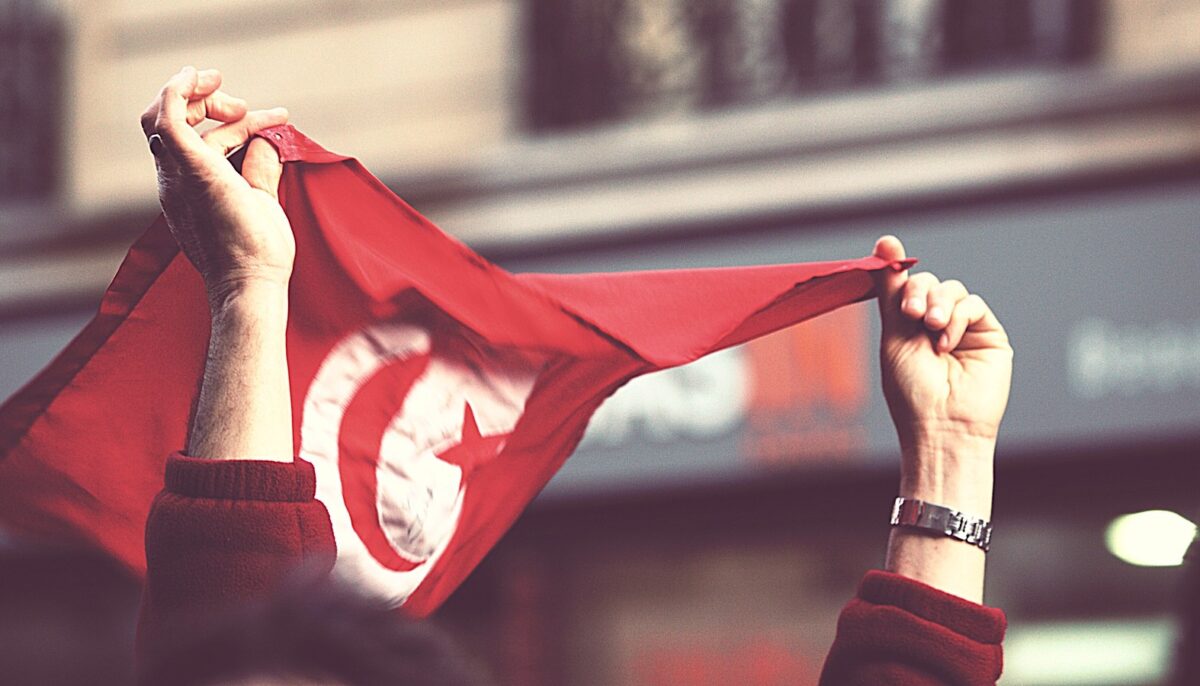Tunisian police summoned fashion designer Myriam Bribri on October 8 following her involvement in protests against poverty, inequality and police brutality. Since this was not the first time she has been targeted for her activism, Bribri was less than surprised. Yet, now she was being summoned in for posting a comment on a video of a police officer assaulting a young man in Nabeul (North East Tunisia).
Two days after sharing the video, Bribri received a phone call from someone alleging he was a Judicial Police agent. He demanded that she come to the police station for interrogation, but thankfully she refused.
Bribri told SMEX that she ignored the call “because the summon is illegal and the officer threatened me.” A day later, she found out that the prosecution had issued a search warrant on account of offending others on social media, as per the Code on Telecommunications. She also learnt that the officer who had summoned her works at the Emergency Police (BIS), “an agency which does not carry out interrogations nor searches.” At the end, the prosecution decided not to arrest Bribri pending a court date set for last December, but it has been postponed due to the judges’ strike.
Mass demonstrations have swept across Tunisia since January, mere days before the 10-year anniversary of the Revolution. A faltering economy under lockdown has left Tunisian youth with no choice but to take their demands to the streets. Demonstrations reignited in late January against police violations, and continued to early February during the commemoration of the assassination of prominent politician Chokri Belaid.
The Bribri case is not an isolated incident, but rather revealed a pattern of misconduct by Tunisian security agencies against activists. Similarly, Bilal Faytouhy was threatened after criticizing the police online for assaulting a girl, defaming her and circulating her photos on police unions. These unions were founded in 2011 to protect the rights of police officers before they cemented their grip on the Ministry of Interior. He was then forced to delete his post after the summons.
As in Bribri’s case, Faytouhy told SMEX that he received a call from someone claiming to be from the Judicial Police, demanding he come in for questioning. “However, I refused, because the way he summoned me was illegal. I consulted lawyers who advised me against complying since I had not received a formal and official summons,” said Faytouhy, adding that his lawyer did not find any file on his case in police records.
In most cases, activists are prosecuted by virtue of the Code of Telecommunications, the law regulating telecommunications, on count of offending others on social media platforms. Usually, such cases end up being dismissed, resulting in an innocent verdict. This is similar to what happened with Ahmed Ghram who was arrested on January 17, 2021 for charges of “disobedience.” The charges followed his Facebook post supporting the recent demonstrations in Tunisia, but the case was dismissed and he was released on January 28.
Nonetheless, imprisoning activists for social media posts is not a new practice in Tunisia.
Math teacher Abdelfattah Said did not imagine that voicing his opinion about the Sousa terrorist operation would lead to a one-year prison sentence in 2015–and a fine of two thousand dinars. This verdict came after he questioned the official story about the terrorist operation in a Facebook post.
Said was not the only one to be imprisoned for questioning the Ministry of Interior’s story about the terrorist attack after the revolution. Due to a post about another operation, the Mnihla Security Operation in 2018, “blogger Sahbi Amri was jailed for a year and a half because he questioned the details of the operation, after a case was filed by the Minister of Interior,” according to politician Samir Bin Omar, Said’s attorney.
Attempts to Legalize Censorship
Ever since 2015, Tunisian security agencies have been pushing for the promulgation of draft law no 25/2015, on preventing the assault of armed forces, in an attempt to bolster their protections. However, the draft law was met with wide rejection from human rights organizations due to the explicit restrictions on the freedom of speech and the freedom of the press.
The draft law includes provisions restricting access to information or the dissemination of security information. It also provides for the arbitrary imprisonment of any offender. Articles 4, 5 and 6 define national security secrets as “information not available to all.” It provides for a 10-year prison sentence for any person who accesses or disseminates such information. Art. 7 of Version 1 of the draft law on “Preventing Assaults on Police” prohibits the unauthorized photographing of the inside of security or military facilities, under the penalty of two years of imprisonment. Art. 12 in that version stipulates that “any person who intentionally disparages armed forces shall be imprisoned for two-years and shall pay a fine of ten thousand dinars.”
Although the draft law was amended in 2017, civil society actors were dissatisfied with the revised version of the draft law. Art. 11 was particularly met with severe backlash. It provides for up to 3 years of imprisonment for “anyone who undermines the dignity and reputation of the internal security forces and who subverts their morale in any form.” Owing to the lobbying of human rights activists and CSOs, on October 12, Parliament postponed voting indefinitely. Nevertheless, security forces’ misconduct against activists on Facebook has not ceased.
Ziad Ghnay, MP affiliated to the Democratic Current, told SMEX that “virtual connections should be regulated based on the freedom of speech, the right of personal data protection and right to dignity, among others.” With over 7 million Tunisian users, social media platforms, especially Facebook, have become a parallel virtual space to express and discuss the crises endured by the community. Ghany believes that “the freedom of speech in the digital world which houses ramified connections among users, and between them and the state, is a complicated issue.”
On the other hand, the lawyer Bassam Trifi, Vice-President of the Tunisian Human Rights League, in a statement to SMEX, denounced what he called “attempts by security forces to restrict the freedom of speech on Facebook by taking legal action against activists.” Trifi warned against “dragging the Judicial Authority into this pattern of behaviour.” He called upon the prosecution to “refrain from engaging with the security forces regarding these cases.”
It is unlikely that security agencies or the prosecution will forgo summoning activists and prosecuting them for social media posts, as evidenced by previous experiences. In 2013, the civil society tried to establish a code of conduct within the framework of a project with UNESCO, to ensure the protection of journalists’ right to access information and their freedom of speech. However, the code was never enforced, according to Mahmoud Zwady, the President of the Tunis Centre for Press Freedom.
Fashion Designer Myriam Bribri is awaiting her trial date, knowing that the verdict hinges on her position on the protests and her involvement. However, this does not deter her from posting her opinions online , unafraid and unwavering she asserts: “there is redemption in resistance.”
Feature image by Gwenael Piaser on Flicker



